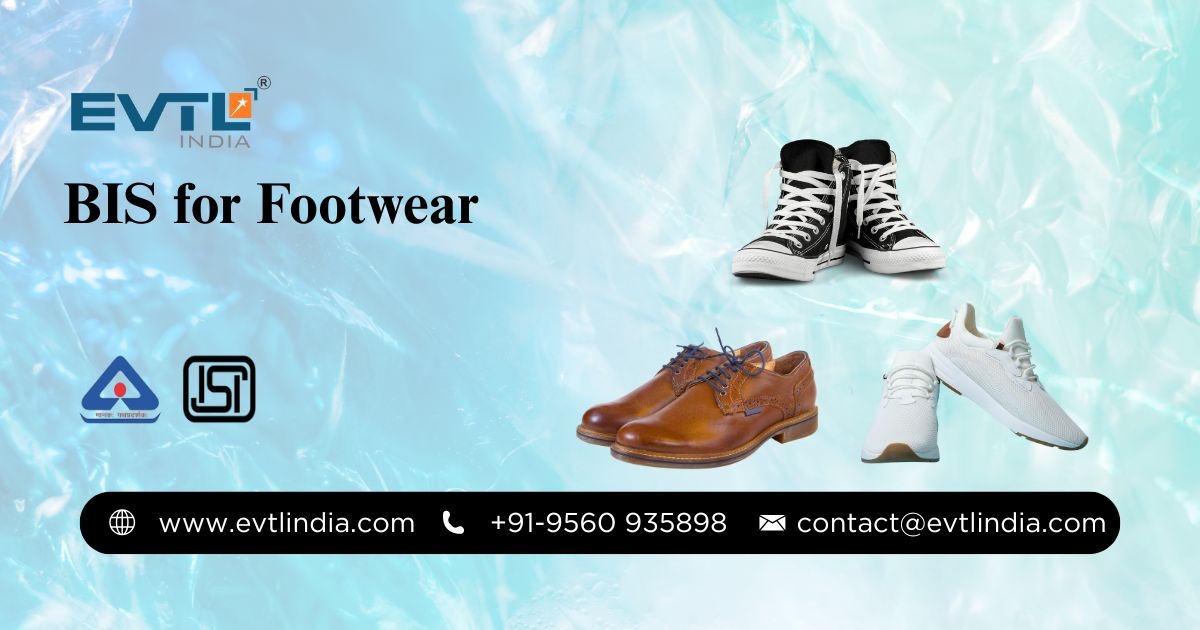The Indian footwear industry is evolving rapidly – from being a low-cost manufacturing base to emerging as a hub for innovation, quality, and compliance. With this evolution, BIS for Footwear has become a non-negotiable standard for manufacturers, importers, and retailers in the country.
Gone are the days when any kind of shoes could be sold in the market with basic labeling and vague specifications. Today, India demands certified quality, safety, and performance—and that’s where the ISI Mark for Footwear comes into play.
Let’s dive into the bigger picture, beyond rules and checkboxes, and understand why this certification is actually a gateway to building consumer trust and international credibility.
🏷️ What Does BIS for Footwear Mean?
The Bureau of Indian Standards (BIS) is India’s national standard-setting body that ensures product safety, consistency, and performance. When we talk about BIS for Shoes, it refers to a mandatory certification under the Quality Control Orders (QCOs) released by the Department for Promotion of Industry and Internal Trade (DPIIT).
Whether you’re a manufacturer of leather shoes, canvas sneakers, safety boots, or sandals – getting BIS certification is no longer optional if your product falls under the regulated categories.
The standard mainly governing footwear is:
-
IS 15844 – For leather safety footwear
-
IS 15298 – For protective footwear
-
IS 3664 – For rubber or PVC footwear
Each standard defines the exact specifications, including durability, material quality, slip resistance, sole flexibility, and more.
🧩 Why BIS Certification for Footwear Matters Now More Than Ever
You may think: “Is this just another compliance headache?”
Not really.
The intent of BIS is deeper and more strategic:
-
Consumer Safety: Poorly made footwear can lead to foot injuries, accidents, and long-term medical issues. BIS ensures that only safe and scientifically-tested products are allowed in the market.
-
Global Benchmarking: Indian footwear brands are increasingly being compared with global players. BIS-certified products hold more weight in exports and international collaborations.
-
Anti-dumping and Market Clean-up: BIS helps filter out sub-standard, unregulated, or dumped foreign products, protecting Indian manufacturers.
-
Credibility for Startups and D2C Brands: For new-age shoe brands, BIS certification acts as a seal of trust and builds confidence among customers.
📜 Getting the ISI Mark for Footwear: Not as Complex as You Think
The ISI Mark for Footwear is a visible stamp of conformity with Indian Standards. Here’s a simplified overview of the steps to obtain it:
-
Application Submission: File your application online on the BIS portal with all required documents.
-
Product Testing: Send samples to BIS-recognized labs for inspection and testing.
-
Factory Audit: BIS officials will inspect your manufacturing unit to check infrastructure, quality systems, and testing capabilities.
-
License Grant: Upon successful inspection and compliance, you receive the BIS license and permission to affix the ISI mark.
For foreign manufacturers, BIS provides a separate route under its Foreign Manufacturers Certification Scheme (FMCS).
👣 BIS for Shoes: What Categories Are Covered?
Currently, the scope of BIS for footwear includes:
-
Leather safety boots and shoes
-
PVC/rubber gumboots
-
Industrial protective footwear
-
Canvas shoes
-
Sports shoes (in some cases)
-
Men’s and women’s formal footwear
-
Certain types of kids' footwear
More categories are being added gradually under new notifications.
🧠 The Value of Hiring a BIS Consultant for Footwear
Let’s face it – the process can feel overwhelming for first-timers or small-scale manufacturers.
That’s where a professional BIS consultant for Footwear makes a difference. From handling documentation to preparing your unit for audits and speeding up the process, consultants reduce your risk of rejection and help avoid costly delays.
Look for a consultant with experience in the footwear segment, BIS standards knowledge, lab coordination, and license maintenance.
EVTL India, for instance, has helped multiple Indian and overseas brands navigate BIS with confidence and speed.
⚙️ Real-World Use Case: What Happens Without BIS Certification?
A manufacturer from Agra once tried to launch a line of PVC footwear without BIS compliance, assuming it was only for leather shoes. The consignment was seized at the warehouse during a random market inspection. Apart from financial losses, it hurt their reputation among distributors.
The takeaway? Always verify if your product falls under a QCO and act in advance.
📊 BIS Footwear Market Trends: What's Coming Next?
With India's focus on "Make in India" and rising consumer awareness, here’s what to expect:
-
More SKUs under BIS radar (e.g., eco-friendly footwear, smart shoes)
-
Integration with eCommerce platforms (Amazon, Flipkart, etc., may mandate BIS listing soon)
-
QR-coded ISI marks for easy verification
-
Heavier penalties for non-compliance
🚀Conclusion
EVTL India is one of the leading BIS Consultant in India, helping manufacturers obtain their BIS licences hassle-free. BIS certification is not just a formality—it’s your license to build, grow, and thrive in India’s competitive footwear market. Whether you're making formal leather shoes, industrial safety boots, or comfy daily wear sandals, meeting BIS for Footwear standards positions you ahead of the curve.
From ISI Mark for Footwear to hiring a reliable BIS consultant for Footwear, every decision shapes your credibility in the eyes of customers, regulators, and the global market.


